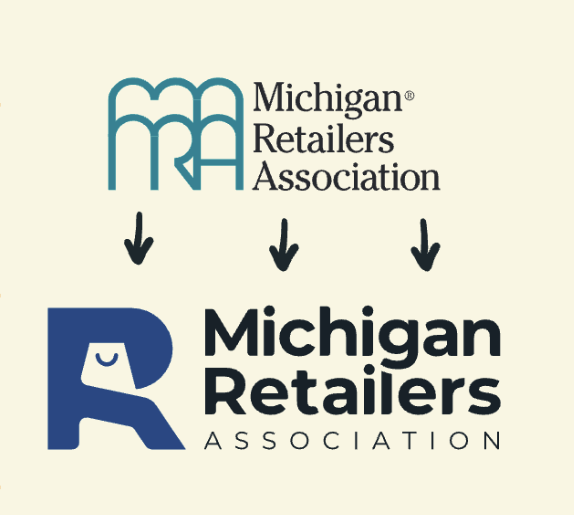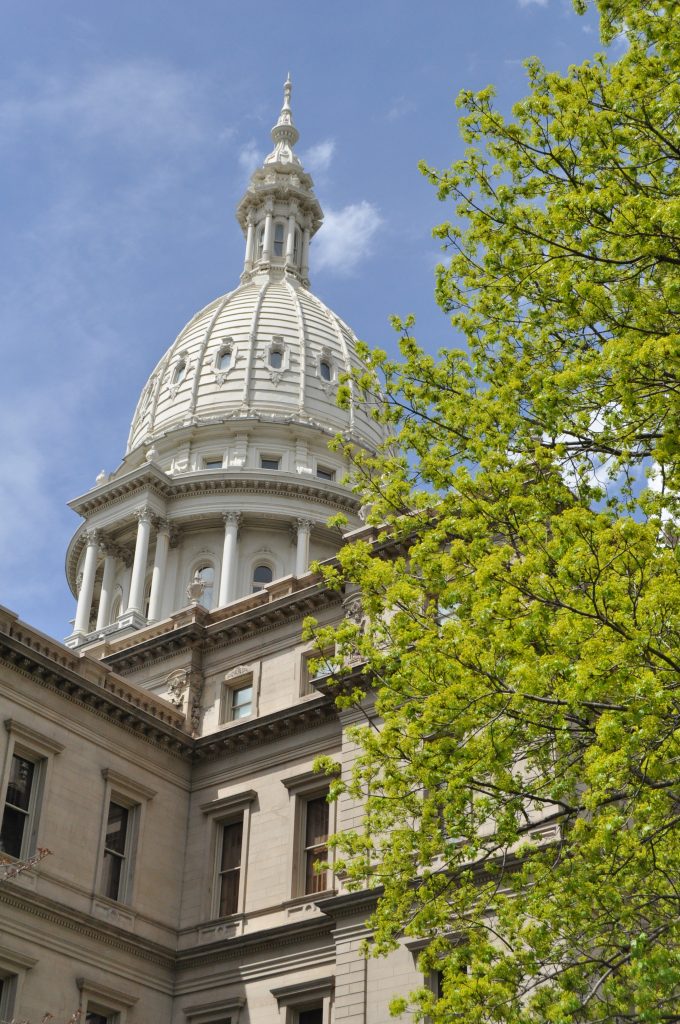Swipe fee victory in Congress
Earlier this week we learned that leaders in Congress removed language that would have repealed debit swipe fee reform (often referred to as the Durbin Amendment) from a bill that makes broad reforms to the Dodd-Frank banking laws. The victory is a huge win for retailers and retail customers.
The Durbin Amendment protects retailers and their customers by capping the fees charged to retailers when a debit card is processed. Without Durbin, financial institutions and card issuers could dramatically increase those fees. Retaining the amendment also ensures that retailers can continue to practice competitive “lowest cost routing.” The bill, called the Financial Choice Act, will move forward for a vote in June without a repeal of the Durbin amendment included. Retailers will need to remain engaged to ensure the repeal language is not reinserted to the bill as it moves through Congress.
Alcohol reforms moving quickly
Both the House and Senate Regulatory Reform Committees were quick to take up legislation introduced earlier this month that makes a number of changes to current laws related to the distribution and sale of alcohol. The House reported four bills yesterday, HB 4556–4559 that prohibit and set new penalties for the unauthorized sale, delivery or importation of beer or wine – including for personal use, limit retail displays to 120 days, and allow employees of wholesalers to sample beer or wine for educational purposes on the wholesaler’s licensed premises. They now head to the Senate for consideration.
On the South side of the Capitol, the Senate reported changes to requirements for transporters and merchandizers to obtain an alcohol salesperson license in SB 356 on May 17. The Senate Regulatory Reform Committee reported two bills on Wednesday, SB 357 and 358. SB 357 codifies, clarifies, and expands the current practice allowing wholesalers or manufacturers to replace beer or wine in certain instances. SB 357 goes further to allow wholesalers or manufacturers to replace or refund beer and wine if the beer or wine is outdated, broken or leaking, off-taste or off-color, contains sediment, is adulterated, contaminated or spoiled. Products can also be refunded or replaced if there were ordering/delivery errors, the brand is discontinued, a seasonal retailer closes, a retailer goes out of business or has a license suspended or revoked or if the IRS or Michigan Department of Treasury seizes the product. Concerns brought up by some manufacturers that the language could more closely mirror federal statute related to refunding and replacing alcohol and to ensure the integrity of the three-tiered system will be discussed on the Senate floor. MRA supports SB 357.
SB 358 would allow a wholesaler or manufacturer to provide retailers with signs that promote the brands and prices of alcoholic products. An amendment adopted in committee to SB 358 codifies a 2004 AG opinion (Opinion #7146) and allows retailers to use illuminated signs.
Other important items to note:
GROCERY/CONVENIENCE
- 500-foot rule: The House approved legislation yesterday, HB 4169, that would grandfather in and codify the Michigan Liquor Control Commission’s (MLCC) current practice of sometimes waiving objections filed by churches or schools within 500 feet of a new beer and wine or liquor license applicant for licenses issued prior to March 1, 2017.
- Beer keg tag elimination: Legislation to eliminate the requirement to tag certain kegs of beer was reported unanimously by the Senate Regulatory Reform Committee on May 18. The bill, SB 372, removes a burdensome requirement for retailers to stick a label on a stainless-steel cylinder that is sweating and prohibits them from accepting the keg back if the label is missing. If the tag is missing the customer loses the $30 deposit and the retailer or brewer is out $100 for the keg. MRA supports the bill and expects the Senate will approve the legislation next week.
- Dogs on patios: The Senate approved legislation on Wednesday that would allow dogs to be present at outdoor seating areas where food is served if certain conditions and standards are maintained. SB 122 requires restaurants to notify the local public health department if they intend to allow customer’s dogs on patios. Restaurants have the right to deny a customer and his or her dog on the patio and local governments can adopt ordinances setting additional regulations prohibiting dogs at outdoor seating areas if they choose. The legislation was referred to the House Regulatory Reform Committee.
PHARMACY
- 90-day prescriptions: The House Health Policy Committee heard testimony on Wednesday on legislation to allow pharmacists to dispense a 90-day supply of medication so long as the prescription allows for enough refills to fill a 90-day supply. SB 360 ensures that pharmacists will not have to call the prescriber for approval as currently required by some insurance plans. MRA testified in support of the legislation. The committee intends to bring up the bill for a vote soon.
- Opioid recommendations: The House Heath Policy Committee approved a package of bills, HB 4403–4408, on Wednesday that include allowing Medicaid to cover addiction treatment, require licensing of pain management clinics (in an attempt to shut down “pill mills”), give pharmacists greater legal immunity on refusing to fill questionability prescriptions, require appropriate grade-level education for students on opioid abuse as part of school health education programs, and require parental consent for opioid prescriptions for minors. The bills will now be considered by the full House.
REGULATIONS
- Postmark date: The House Regulatory Reform Committee took testimony Wednesday on a bill that would create the Postmark Acknowledgment Act. HB 4387 would clarify that all state agencies and departments must accept the postmark date as an indication of timely submission. The committee heard opposition from state agencies and departments who argued this change would require a substantial and costly change in how departments open and process mail. It could conflict with various statutory requirements including election deadlines. The committee is expected to continue discussions with the departments on the legislation.
- Prohibit stricter state rules: The House narrowly approved legislation that would prohibit state agencies and departments from adopting rules stricter than federal regulations on May 18. The legislation, HB 4205, now heads to the Senate Oversight Committee for consideration.
TAXES
- City income tax administrative procedures: Legislation that seeks to codify current administrative procedures used by the Michigan Department of Treasury when assisting the City of Detroit in collecting its city income tax was introduced as HB 4618 on May 17. The bill was referred to the House Tax Policy Committee.
- PPT exemption deadline: Snyder signed legislation into law yesterday as Public Act 42 of 2017 that moves the deadline to submit a document for an exemption from the Personal Property Tax (PPT) from February 20 to May 31. The bill seeks a resolution to the problem that February 20, 2017 fell on a federal holiday (President’s Day) which really requires the exemption be sent several days prior. The bill is seen as a short-term solution and the bill sponsor hopes to craft a long-term solution later this term that will ensure the Department of Treasury receives all filings on time. The new law took effect yesterday and extends this year’s deadline to May 31.
- TIF consolidation: Legislation that would roll all of the state allowed tax increment finance authorities into a single act was introduced as SB 393 on May 18. The bill was referred to the Senate Economic Development and International Investment Committee which is chaired by the bill sponsor, a sign the bill will be seriously considered.
- Tribunal procedures: The House Tax Policy Committee reported legislation on May 17 that seeks to make various revisions to the Michigan Tax Tribunal. The bill, HB 4412, would modify tribunal membership, current compensation for tribunal members, limit tribunal members’ other business activities, clarify the disqualification process from hearings, change deadlines, increase the taxable value that can be reviewed in the small claims division, and allow the tribunal to promulgate rules regarding ethical standards. The committee adopted several amendments and reported a substitute bill. One of the amendments adopted that would require taxpayers to file all expert valuation disclosures within four months of filing an appeal. MRA opposes this amendment and will seek to have it removed on the House floor.
OTHER
- 911 fees: Legislation introduced this week as SB 400 and HB 4651 would increase the current 911 fee from 19 cents/month to 25 cents/month per line. MRA has heard this increase could result in a $33 million tax increase on business and residential phone bills. It will result in higher surcharges on all landline, wireless, and pre-paid wireless phone bills. The bills were respectively referred to the Senate Energy and Technology Committee and the House Communications and Technology Committee.
- Debt collector reforms: Legislation that seeks to further limit licensed debt collectors’ behaviors and establishes penalties was introduced as HB 4657–4658 on Wednesday. The bills prohibit a debt collector from implicating a debtor in a crime, engaging in verbal or physical violence or incite the debtor to commit an assaultive crime. A violator is guilty of a misdemeanor punishable by a fine up to $2,500 and/or a year in jail. The bill was referred to the House Financial Services Committee.
- Internet gaming: Snyder signed SB 202 into law as Public Act 41 of 2017 on Tuesday. The new law legalizes and regulate Internet gaming including gambling via social media.
- Security alarm license exemptions: Legislation introduced as HB 4654–4655 on Wednesday seeks to authorize and exempts installation, maintenance, and servicing of a business monitoring system from electrician’s permit, security alarm licensing, and construction code permit requirements. The legislation reflects new technology that allows businesses to remotely monitor the premises through audio, video, or sensor detection. The bill was referred to the House Communications and Technology Committee and is scheduled for a hearing on Tuesday.






